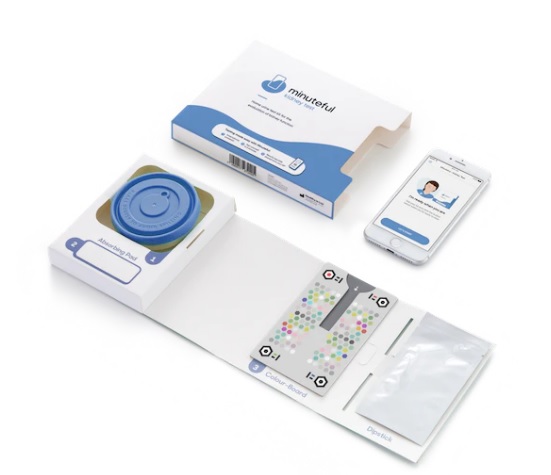Summary
Kidney care costs the NHS more than £1.5bn a year.
Healthy.io’s Minuteful Kidney home kidney albumin to creatinine ratio (ACR) test identifies more patients at-risk of Chronic Kidney Disease and associated cardiovascular disease.
This provides an opportunity to identify patients most at risk, intervene, and improve patient care, which can help prevent the escalation of these serious conditions, reducing the significant care needs associated with cardiovascular events and End Stage Renal Disease (ESRD).
In the three years that the evaluation has been running, the service has engaged 435,000 patients of whom, 238,000 have tested at home at a time of their convenience.
Overview of Innovation
Minuteful Kidney targets the untested, underserved, and underdiagnosed population. As with most inequalities, this tends to be in lower socio-economic groups.
The test is posted direct to the patient. The app, which is also supported by an inhouse contact centre, assists the patient in the completion of the test and returns the result instantly to their GP. This means that a patient can test their kidney health, at home in three minutes in comparison to a standard care model that requires travel and GP time and can take over three days.
Impacts of innovation to date
The fully recyclable test saves patients travel, work, and care time by enabling them to undertake their ACR test in the comfort of their own home, which supports the NHS net zero ambitions.
Post-test surveys of the patients engaged by the service to date provide the following returns:
- 90% rated the app ‘easy’ or ‘very easy’ to use
- 94% said they have no issues
- Only 8% said they would prefer to test at the GP practice
- 78% of patients used the app without help or support from a relative or carer
- 91% said the information for managing results and what to do next was helpful or very helpful
York Economic Health Consortium (YHEC) was commissioned by Health Innovation Yorkshire & Humber to evaluate cost effectiveness and feasibility in primary care and concluded time saved per GP practice per year is 2,475 minutes (equivalent to 41.25 hours, slightly more than a typical working week in the UK).
Additionally, 82% of GPs surveyed would recommend the service above the standard model of care.
YHEC also developed a peer-reviewed economic evaluation, which demonstrates that, if Minuteful Kidney was scaled to the untested in the NHS, it would save approximately £660m and avoid over 2,400 deaths in five years.
Innovator quote
Damian O’Boyle, Director of Client Services: “The health innovation networks’ support in finding pilot sites was integral to Healthy.io’s evidence generation, which enabled the submission to the Accelerated Access Collaboration AI Award and subsequent scaling.”
Health Innovation Network involvement
Initially tested in Yorkshire, supported by Health Innovation Yorkshire & Humber, Healthy.io has since received support from health innovation networks across all 22 ICBs where Minuteful Kidney is currently operational. Research, evidence generation, and cost effectiveness are crucial to underpinning scaling and the health innovation networks have assisted in identifying and closing gaps. health innovation networks have also supported by identifying potential funding pots, guiding, and navigating systems and providing introductions to key decision-makers.
Innovation pathway
Spread and adoption
Is the innovation supported by a health innovation network programme?
Minuteful Kidney has received support from the Accelerated Access Collaborative

There is a wealth of HealthTech innovators poised to help solve some of the NHS’ greatest challenges, yet getting a product or new technology adopted at scale in the NHS is far from straightforward. In a recent ABHI member’s survey*, procurement was cited as one of the biggest barriers that innovators face, particularly those from [...]

Tellmi is a social enterprise innovation which aims to address the growing demand for mental health services and tackle health inequalities for young people. It is a digital peer support app available launched in 2017 by psychologist Suzi Godson PhD and engineer Kerstyn Comley PhD. Kersytn explains how Tellmi works. Tell us about the innovation. [...]

The NHS is facing record demand for services. According to The Health Foundation, the NHS waiting list for elective treatment in England has almost tripled in size over the last decade to 7.7 million. And latest figures show there were a record 2.35 million attendances at A&E across England in March this year. We know [...]







